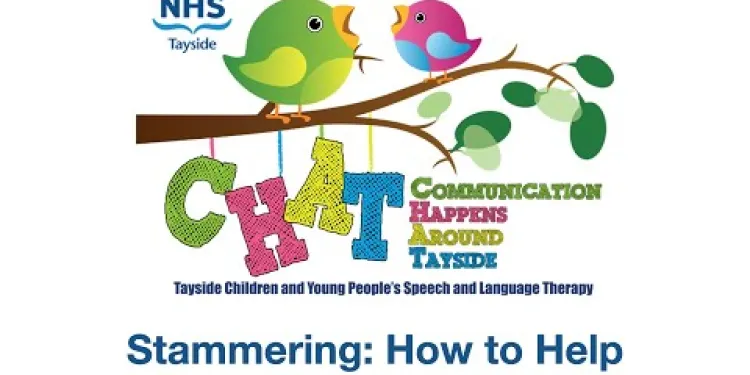Find Help
More Items From Ergsy search
-

Stammering: myths about the cause of stammering
Relevance: 100%
-

My Stammering Child
Relevance: 96%
-

Stammering myth 4: You should ignore a child's stammer
Relevance: 94%
-

Stammering: How to Help
Relevance: 93%
-

Why do some children stammer?
Relevance: 89%
-

Adam's story on stammering - Therapy
Relevance: 89%
-

Will's story on having therapy - Stammering
Relevance: 88%
-

Giving Voice - Stammer and Fluency Problems
Relevance: 87%
-

Practical strategies to support young children who stammer
Relevance: 81%
-

I don’t need to be fixed – what I wish the world understood about stammering
Relevance: 78%
Stammering: How to Help
Understanding Stammering
Stammering, also known as stuttering, is a speech disorder that affects the fluency of speech. It is characterised by repetitions, prolongations, or blocks in sounds, syllables, or words. This can make communication challenging and can impact an individual's confidence and social interactions.
Providing Emotional Support
It's crucial to offer emotional support to those who stammer. Listening patiently and maintaining eye contact can help build their confidence. Avoid showing impatience or interrupting them while they speak. Encouraging them and acknowledging their strengths can also be beneficial.
Creating a Supportive Environment
Creating a safe and supportive environment is key to helping someone who stammers. Engage in regular conversations at a relaxed pace and give them ample time to express themselves. Foster an environment where they feel comfortable speaking without fear of judgment.
Seeking Professional Help
Speech and language therapy can be very effective for people who stammer. Professional therapists can offer tailored strategies to improve speech fluency. In the United Kingdom, services like the National Health Service (NHS) provide access to such therapies. Referral from a GP may be necessary to access these services.
Encouraging Self-Help Strategies
Individuals who stammer can benefit from various self-help strategies. Encourage them to practice deep breathing exercises and mindfulness techniques to manage anxiety. Speaking slowly and deliberately can also help in reducing stammering.
Joining Support Groups
Support groups can provide a sense of community and shared understanding for individuals who stammer. Organisations like the British Stammering Association (BSA) offer resources, support, and opportunities to connect with others who have similar experiences. Participation in these groups can foster a sense of belonging and provide practical tips.
Educational Resources
Educating yourself and others about stammering can promote understanding and empathy. The BSA and NHS websites offer comprehensive information on stammering, including tips for supporting individuals who stammer. Raising awareness can help break down societal stigmas associated with stammering.
Conclusion
Helping someone who stammers involves patience, understanding, and support. By creating supportive environments, encouraging professional help, and promoting self-help strategies, you can make a significant positive impact on their lives. In the UK, various resources and organisations are available to provide assistance and guidance.
Stammering: How to Help
What is Stammering?
Stammering means having trouble talking smoothly. You might repeat words or get stuck on sounds. This can make talking to people hard.
Being Kind and Helpful
It is important to be kind to people who stammer. Listen to them and look at them while they talk. Do not rush or interrupt them. Tell them what they are good at to build their confidence.
Making a Safe Place
Make a safe and calm place for people who stammer. Talk to them at a slow speed and give them time to talk. This helps them feel safe and not scared to talk.
Getting Help from Professionals
Seeing a speech therapist can help a lot. Therapists teach ways to talk more easily. In the UK, the NHS can help find a therapist. You might need to ask a doctor to see one.
Helping Themselves
People who stammer can try some tips on their own. Deep breathing and being calm help with talking. Speaking slowly can also make it easier.
Joining Groups
Joining groups can help people who stammer feel understood. Groups like the British Stammering Association have tips and support. Being with others who stammer can help them feel they are not alone.
Learning More
Learning about stammering helps everyone understand better. Websites like the BSA and NHS have good information. Knowing more can help everyone be kinder and more helpful.
Conclusion
Helping someone who stammers means being patient and supportive. Make safe places, get professional help, and share tips. In the UK, there are many resources to help.
Frequently Asked Questions
What is stammering?
Stammering, also known as stuttering, is a speech disorder characterized by repeated or prolonged sounds, syllables, or words, causing interruptions in the normal flow of speech.
What causes stammering?
The exact cause of stammering is unknown, but it is believed to be a combination of genetic, neurological, and environmental factors.
At what age does stammering typically begin?
Stammering usually begins between the ages of 2 and 5, although it can start later in some cases.
Can stammering be cured?
There is no cure for stammering, but therapy and support can help individuals manage the condition and improve their speech fluency.
How can I help someone who stammers?
Be patient, maintain eye contact, listen without interrupting, and give them time to express themselves. Encourage them and create a supportive environment.
Is stammering hereditary?
Stammering can run in families and there appears to be a genetic component, but it is not solely inherited.
Does stress cause stammering?
Stress does not cause stammering, but it can exacerbate the condition in individuals who already stammer.
Can children outgrow stammering?
Some children may outgrow stammering, especially with early intervention and support, but others may continue to stammer into adulthood.
What types of therapy are available for stammering?
Therapies include speech and language therapy, cognitive behavioural therapy, and support groups. Techniques such as controlled speech practice and relaxation exercises are also used.
Is stammering more common in males or females?
Stammering is more common in males, with a ratio of approximately 4:1 between males and females.
Can using electronic devices help with stammering?
Some electronic devices can help by providing auditory feedback, which may aid in fluency. However, their effectiveness can vary among individuals.
How should teachers support students who stammer?
Teachers should create a supportive classroom environment, allow additional time for speaking, avoid completing sentences for the student, and collaborate with speech therapists.
Does mimicking someone who stammers help in understanding their condition?
Mimicking or imitating someone who stammers is disrespectful and unhelpful. It is more effective to learn about the condition and understand its impact.
Are there any famous people who stammered?
Yes, many successful individuals, such as actor Colin Firth, singer Ed Sheeran, and former Prime Minister Winston Churchill, have experienced stammering.
Where can I find support for stammering in the UK?
Support can be found through organizations like the British Stammering Association, speech and language therapy clinics, and local support groups.
What does stammering mean?
Stammering is when someone finds it hard to talk smoothly.
Sometimes, they may repeat sounds or words. They might also pause or get stuck on words.
Here are some ways to help:
- Listen patiently when they talk.
- Don't rush them or finish their sentences.
- Speak slowly and clearly yourself.
Stammering, also called stuttering, is when talking is hard. People might repeat sounds, parts of words, or whole words. This can make it tough to talk smoothly.
Why do people stammer?
We don't know for sure why people stammer. It might be because of their genes, their brain, and things around them.
When do people usually start to stammer?
Stammering usually starts when kids are between 2 and 5 years old. It can also start when they are older, but that is not as common.
Can stammering be cured?
Stammering can be helped. People who stammer can get better with practice and help. Some things that can help are:
- Talking with a speech therapist
- Practicing slow speaking
- Learning to relax when speaking
- Using apps or tools to help with speech
Remember, everyone is different. What works for one person might not work for another. It's okay to try different things to see what helps you.
There is no way to make stammering completely go away, but you can get help. Talking to a therapist and getting support from others can help you speak more smoothly.
How can I help someone who has trouble speaking?
When someone has trouble with speaking, you can help them feel better. Here are some simple ways to help:
- Listen patiently: Wait and give them time to finish what they want to say.
- Stay calm: Keep a kind face and do not get upset if it takes time.
- Don't interrupt: Let them speak without stopping them.
- Ask easy questions: Use simple words and questions that need short answers.
- Show you're listening: Use eye contact and nod your head gently.
These steps can help make talking easier for them. You can also try playing games that focus on speaking or use pictures to help tell stories together.
Be patient. Look at the person when they talk. Listen without stopping them. Give them time to say what they want. Show support and cheer them on. Make them feel safe and comfortable.
Can you be born with a stammer?
Some people are born with a stammer because it runs in their family. This means if someone in your family has a stammer, you might have one too.
If you find this hard, that's okay. You can talk to a doctor or speech therapist. They can help.
Stammering, which means having trouble speaking, can happen in families. It might be because of something in the genes, but it's not only inherited.
Here are some things that can help:
- Work with a speech therapist: They can help you practice speaking clearly.
- Take your time: It’s okay to speak slowly.
- Practice speaking: Try talking in front of a mirror.
- Stay calm: It's okay if you stammer. You can take a deep breath and try again.
Can stress make you stutter?
Stress does not make people start stammering. But, if someone already stammers, stress can make it worse.
Can children stop stammering as they grow?
Some children might stop stammering as they grow up, especially if they get help early on. But some children might stammer when they become adults too.
What helps people who stammer?
Some people have trouble speaking because they stammer. Here are ways to help:
- Speech Therapy: A special teacher helps you learn to speak clearly.
- Practice Speaking: Talk slowly and practice with family and friends.
- Relaxation: Stay calm and take deep breaths before speaking.
- Technology Tools: Use apps that help with speaking practice.
These can help make talking easier and more fun!
There are different types of help that can make talking and thinking easier. Some of these are:
- Talking therapy – A special teacher helps you with words and talking.
- Thinking therapy – This helps you think in a better way.
- Support groups – You can meet with other people who have the same problem.
You can also try some special tricks to help you:
- Practice talking slowly.
- Do exercises to help you stay calm and relaxed.
These can help you feel better and talk more easily.
Do boys or girls stammer more?
Stammering is when talking is hard because the words get stuck.
Boys stammer more than girls.
If you stammer, you can talk to a speech therapist for help.
Stammering happens more in boys than in girls. For every 5 people who stammer, about 4 are boys and 1 is a girl.
Can using electronic devices help with stammering?
People who stammer sometimes use special electronic tools. These tools can help them talk more easily.
These devices might repeat what you say in your ear. Hearing your voice like this can sometimes help you talk without stammering.
If you have trouble reading this, ask someone you trust to explain it to you.
Some electronic tools can help. They can give sounds to help you speak better. These tools help some people, but not everyone.
How can teachers help students who stutter?
Teachers can do a lot to help students who stutter. Here are some simple ideas:
- Listen patiently when a student is talking. Do not interrupt or finish their sentences.
- Speak slowly and clearly. This can make it easier for the student to follow along.
- Give the student time to say what they want. Do not rush them.
- Make eye contact and show you are listening.
- Encourage the student to participate in class, but do not force them to speak if they’re not ready.
- Create a supportive classroom where everyone is kind and respects each other.
- If needed, use tools like picture cards or writing to help the student communicate.
Being kind and patient helps students who stutter feel more comfortable and confident at school.
Teachers can help by making the classroom a friendly place. They should give students extra time to talk and not finish sentences for them. Teachers can also work with speech helpers.
Can copying someone who stutters help us understand them better?
If you copy how a person who stutters talks, can it help you learn about stuttering?
Here are some tips to help you understand:
- Listen carefully to them.
- Be patient and give them time to speak.
- Use feelings or drawing to show how they might feel.
- Watch videos or read books about stuttering.
- Ask a teacher or a helper for more information.
Copying someone who has a stammer is not kind and does not help. It is better to learn about stammering and how it affects people.
Did any famous people stutter when they talked?
Yes, many people who are very good at what they do have had stammering. This includes people like actor Colin Firth, singer Ed Sheeran, and former leader Winston Churchill.
Where can I get help for stammering in the UK?
If you or someone you know has a stammer, there are places where you can get help.
Here are some ideas:
- Talk to your doctor. They can tell you where to get help.
- Look for speech and language therapists. They are experts who can help with talking.
- Check online for support groups for people who stammer.
- Ask at school or work if they know about any help you can get.
Try using tools like apps to practice talking. This can be fun and helpful!
You can get help from places like the British Stammering Association. There are also speech and language therapy clinics and local groups where people can support each other.
Useful Links
This website offers general information and is not a substitute for professional advice.
Always seek guidance from qualified professionals.
If you have any medical concerns or need urgent help, contact a healthcare professional or emergency services immediately.
Some of this content was generated with AI assistance. We’ve done our best to keep it accurate, helpful, and human-friendly.
- Ergsy carfully checks the information in the videos we provide here.
- Videos shown by Youtube after a video has completed, have NOT been reviewed by ERGSY.
- To view, click the arrow in centre of video.
- Most of the videos you find here will have subtitles and/or closed captions available.
- You may need to turn these on, and choose your preferred language.
- Go to the video you'd like to watch.
- If closed captions (CC) are available, settings will be visible on the bottom right of the video player.
- To turn on Captions, click settings .
- To turn off Captions, click settings again.
More Items From Ergsy search
-

Stammering: myths about the cause of stammering
Relevance: 100%
-

My Stammering Child
Relevance: 96%
-

Stammering myth 4: You should ignore a child's stammer
Relevance: 94%
-

Stammering: How to Help
Relevance: 93%
-

Why do some children stammer?
Relevance: 89%
-

Adam's story on stammering - Therapy
Relevance: 89%
-

Will's story on having therapy - Stammering
Relevance: 88%
-

Giving Voice - Stammer and Fluency Problems
Relevance: 87%
-

Practical strategies to support young children who stammer
Relevance: 81%
-

I don’t need to be fixed – what I wish the world understood about stammering
Relevance: 78%

